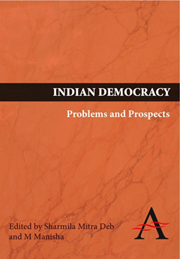Book contents
- Frontmatter
- Contents
- List of Contributors
- PREFACE
- Introduction DEMOCRATIC POLITICS IN INDIA: CONCEPTS, CHALLENGES AND DEBATES
- 1 RECONSTRUCTING DEMOCRATIC CONCERNS IN INDIA
- 2 ARE WE READY FOR DEMOCRACY? A FEW OBSERVATIONS
- 3 DEMOCRACY AND POVERTY IN INDIA
- 4 DEMOCRACY AND FEDERALISM IN INDIA: TWO EPISODES AND A SET OF QUESTIONS
- 5 INDIA'S COALITION FUTURE?
- 6 HOW DEMOCRATIC IS OUR PARLIAMENT? ELITE REPRESENTATION AND FUNCTIONAL EFFICIENCY OF LOK SABHA
- 7 DEMOCRACY'S JANUS FACE: A REVIEW OF ELECTIONS IN POST-INDEPENDENCE INDIA
- 8 THE NATURE OF THE OPPOSITION IN INDIA'S PARLIAMENTARY DEMOCRACY
- 9 RESTYLING DEMOCRACY? MAINSTREAM MEDIA AND PUBLIC SPACE VIS-À-VIS INDIAN TELEVISION
- 10 THE POOR WORKING WOMEN: THE ACHILLES HEEL OF INDIAN DEMOCRACY – A PROFILE OF THE MAIDSERVANT FROM THE BUSTEES OF KOLKATA
- 11 HOW IS DEMOCRACY IN SOUTH ASIA? A COMPARISON OF THE ELITE AND THE MASS ATTITUDES
Introduction DEMOCRATIC POLITICS IN INDIA: CONCEPTS, CHALLENGES AND DEBATES
Published online by Cambridge University Press: 05 March 2012
- Frontmatter
- Contents
- List of Contributors
- PREFACE
- Introduction DEMOCRATIC POLITICS IN INDIA: CONCEPTS, CHALLENGES AND DEBATES
- 1 RECONSTRUCTING DEMOCRATIC CONCERNS IN INDIA
- 2 ARE WE READY FOR DEMOCRACY? A FEW OBSERVATIONS
- 3 DEMOCRACY AND POVERTY IN INDIA
- 4 DEMOCRACY AND FEDERALISM IN INDIA: TWO EPISODES AND A SET OF QUESTIONS
- 5 INDIA'S COALITION FUTURE?
- 6 HOW DEMOCRATIC IS OUR PARLIAMENT? ELITE REPRESENTATION AND FUNCTIONAL EFFICIENCY OF LOK SABHA
- 7 DEMOCRACY'S JANUS FACE: A REVIEW OF ELECTIONS IN POST-INDEPENDENCE INDIA
- 8 THE NATURE OF THE OPPOSITION IN INDIA'S PARLIAMENTARY DEMOCRACY
- 9 RESTYLING DEMOCRACY? MAINSTREAM MEDIA AND PUBLIC SPACE VIS-À-VIS INDIAN TELEVISION
- 10 THE POOR WORKING WOMEN: THE ACHILLES HEEL OF INDIAN DEMOCRACY – A PROFILE OF THE MAIDSERVANT FROM THE BUSTEES OF KOLKATA
- 11 HOW IS DEMOCRACY IN SOUTH ASIA? A COMPARISON OF THE ELITE AND THE MASS ATTITUDES
Summary
The twentieth century has witnessed a tremendous reinforcement of the concept of democracy. In a period of about a hundred years, the virtues of democracy have been greatly extolled and the world has witnessed a process of democratization. In Eastern Europe, totalitarian regimes have been replaced by democracies, military dictatorships in Latin American countries have been discredited and one party systems have been challenged by opposition parties. Military dictatorships where they exist have adopted a facade of democracy in an attempt to seek legitimacy and survive. Political analysts like Francis Fukayama have suggested that contemporary reality bears witness to the universal victory of democracy, at least in its liberal–democratic form. Samuel Huntington, the renowned American political scientist, has indicated a ‘third wave’ of democratization, in which authoritarian and military regimes have been challenged by movements of ‘people power’ in developing countries like Philippines, Mexico and Indonesia. Political regimes across the world are involved in furthering the cause of democratic reforms. Nations seek legitimacy by attempting to establish a democratic form of governance. The twentieth century has turned into an age of democratic triumph.
The main alternatives to democracy such as monarchy, hereditar y aristocracy and open oligarchy have declined rapidly. Many of these forms of government were replaced by anti-/non-democratic regimes such as Fascism, Nazism and Leninism. In the Freedom House survey of 2007, over 123 countries were identified as democracies, while 150 countries were categorized as partial democracies.
- Type
- Chapter
- Information
- Indian DemocracyProblems and Prospects, pp. xi - xxxiiPublisher: Anthem PressPrint publication year: 2009



